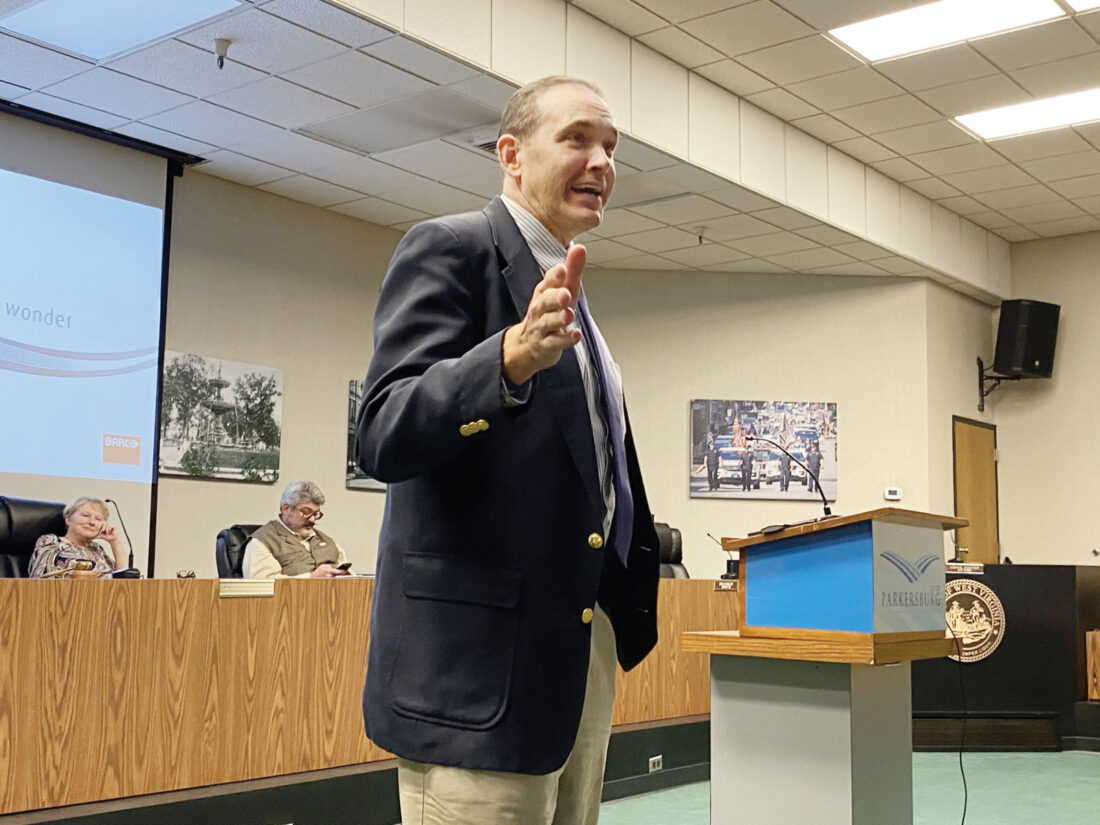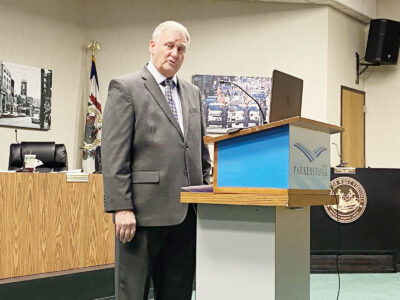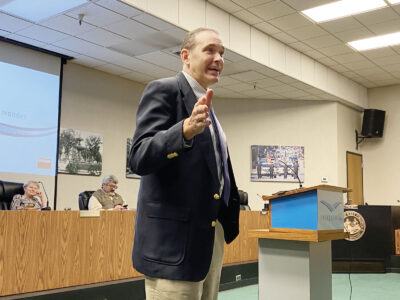Wood County Prevention Coalition discusses substance abuse battle
- Former Parkersburg Mayor Bob Newell talked Tuesday as part of the annual presentation of the Wood County Prevention Coalition. Presenters talked about factors that lead area students to drug and alcohol abuse and things being done to address them. (Photo by Brett Dunlap)
- Greg Puckett, a Mercer County Commissioner and member of the national board for the Community Anti-Drug Coalitions of America, spoke Tuesday at Parkersburg City Council chambers as part of the Wood County Prevention Coalition town hall meeting. He talked and shared stories about how drug abuse continues to impact West Virginia. (Photo by Brett Dunlap)

Former Parkersburg Mayor Bob Newell talked Tuesday as part of the annual presentation of the Wood County Prevention Coalition. Presenters talked about factors that lead area students to drug and alcohol abuse and things being done to address them. (Photo by Brett Dunlap)
PARKERSBURG — Communities need to work more to help break the cycle of drug abuse, officials said Tuesday night in Parkersburg.
The Wood County Prevention Coalition held a town hall meeting Tuesday to discuss efforts to combat substance abuse with over 30 people in attendance in Parkersburg City Council Chambers.
The coalition was formed in 2015.
“Our mission is to spread awareness to parents and children in K-12,” said former Parkersburg Mayor Bob Newell who serves on the board. “We have done quite a bit in prevention programs (getting messages out to local school children about the dangers of drug abuse as well as reward programs, getting parental involvement and more).”
Cathy Grewe, counselor coordinator for Wood County Schools, shared the results of the third Pride Survey that showed how much students are using drugs (including nicotine) and alcohol.

Greg Puckett, a Mercer County Commissioner and member of the national board for the Community Anti-Drug Coalitions of America, spoke Tuesday at Parkersburg City Council chambers as part of the Wood County Prevention Coalition town hall meeting. He talked and shared stories about how drug abuse continues to impact West Virginia. (Photo by Brett Dunlap)
The survey is given to students in grades 6, 8, 9 and 11. The students self report if they use or not.
The data showed that right before COVID hit, vaping was growing in popularity. The amount went down in 2020-21 in the ninth and 11th grades. Marijuana use has also seen a decrease.
“Alcohol went up during COVID,” Grewe said. “Students were home and alcohol was readily available.
“Now that we are post-COVID, we have seen that use start to go down.”
Drug abuse has been occurring at home, at a friend’s house, at school or some other place. For grades 6-8 substance abuse was occurring more in the home, Grewe said. For grades 9-12, use at home is going up, she said.
The coalition has had prevention messages for a number of years and a large curriculum to educate students which has seen some success due to the cooperation between the communities and the schools.
“We are seeing the benefits of that,” Grewe said.
Mental health plays a part in whether students are likely to abuse drugs.
“Students who suffer depression are often more likely to abuse or turn to drugs or alcohol,” Grewe said. “We need to be aware of what is going on.”
There is a relationship between adverse childhood experience and drug and alcohol addiction, including abuse, neglect and household dysfunction.
“Students who drink alcohol are three times more likely to think about suicide and students who use marijuana are five times more likely to think about suicide,” Grewe said.
She said students turn to drugs as a form of acceptance from others as well as a way of coping with what is happening in their lives.
“We have to break the cycle,” she said. “Prevention is key.”
Greg Puckett, a Mercer County Commissioner and member of the national board for the Community Anti-Drug Coalitions of America, was the main speaker. He talked about encountering a 5-year-old who was caught vaping and talked about having given Narcan to two people who were overdosing.
In a lot of communities in West Virginia, they have to prioritize their efforts. With all the programs available, they have to focus on what happens when that kid goes back home and is surrounded by all the factors that led them to abuse.
“We are all EMS,” he said. “We can help to make sure the environment those people live in each and every day is stronger.”
He talked about how the opioid settlement money needs to be invested and do programs that can help create a better social environment statewide as well as create a strong workforce for jobs.
Parkersburg Mayor Tom Joyce, who is representing the region on the West Virginia First Foundation, talked about how the nonprofit organization will determine how three-quarters of the more than $1 billion in opioid settlement money will be distributed.








